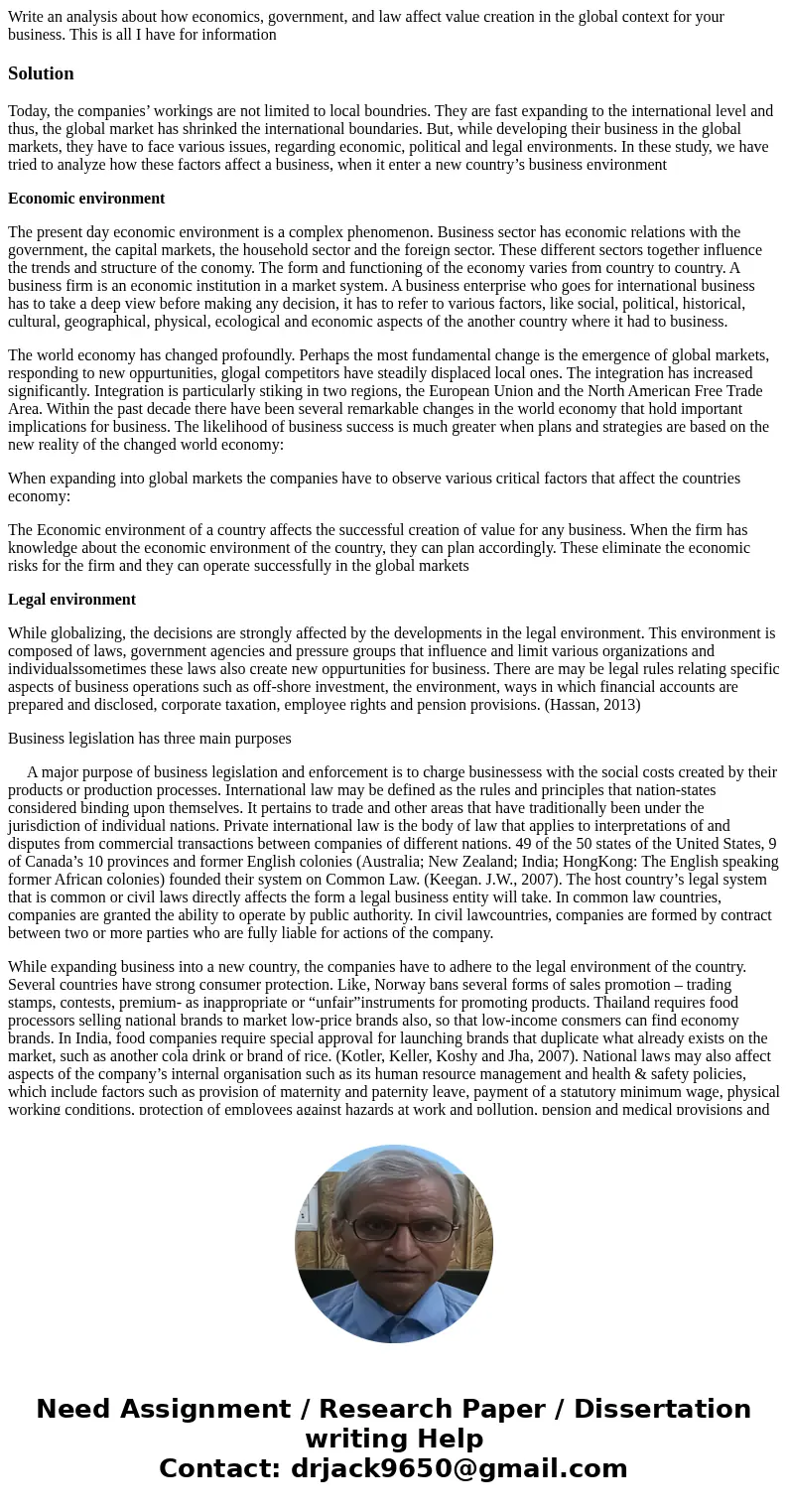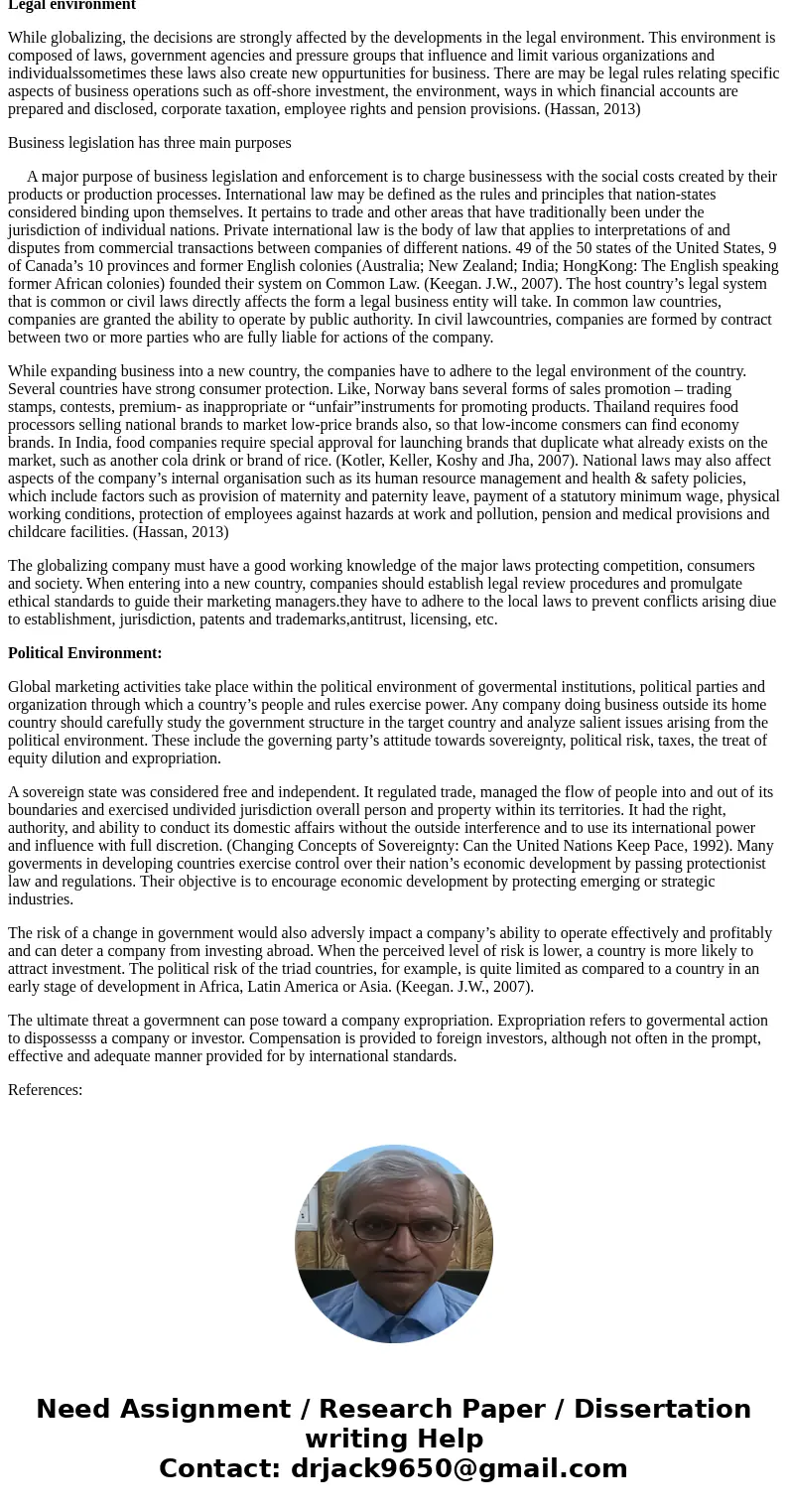Write an analysis about how economics government and law aff
Write an analysis about how economics, government, and law affect value creation in the global context for your business. This is all I have for information
Solution
Today, the companies’ workings are not limited to local boundries. They are fast expanding to the international level and thus, the global market has shrinked the international boundaries. But, while developing their business in the global markets, they have to face various issues, regarding economic, political and legal environments. In these study, we have tried to analyze how these factors affect a business, when it enter a new country’s business environment
Economic environment
The present day economic environment is a complex phenomenon. Business sector has economic relations with the government, the capital markets, the household sector and the foreign sector. These different sectors together influence the trends and structure of the conomy. The form and functioning of the economy varies from country to country. A business firm is an economic institution in a market system. A business enterprise who goes for international business has to take a deep view before making any decision, it has to refer to various factors, like social, political, historical, cultural, geographical, physical, ecological and economic aspects of the another country where it had to business.
The world economy has changed profoundly. Perhaps the most fundamental change is the emergence of global markets, responding to new oppurtunities, glogal competitors have steadily displaced local ones. The integration has increased significantly. Integration is particularly stiking in two regions, the European Union and the North American Free Trade Area. Within the past decade there have been several remarkable changes in the world economy that hold important implications for business. The likelihood of business success is much greater when plans and strategies are based on the new reality of the changed world economy:
When expanding into global markets the companies have to observe various critical factors that affect the countries economy:
The Economic environment of a country affects the successful creation of value for any business. When the firm has knowledge about the economic environment of the country, they can plan accordingly. These eliminate the economic risks for the firm and they can operate successfully in the global markets
Legal environment
While globalizing, the decisions are strongly affected by the developments in the legal environment. This environment is composed of laws, government agencies and pressure groups that influence and limit various organizations and individualssometimes these laws also create new oppurtunities for business. There are may be legal rules relating specific aspects of business operations such as off-shore investment, the environment, ways in which financial accounts are prepared and disclosed, corporate taxation, employee rights and pension provisions. (Hassan, 2013)
Business legislation has three main purposes
A major purpose of business legislation and enforcement is to charge businessess with the social costs created by their products or production processes. International law may be defined as the rules and principles that nation-states considered binding upon themselves. It pertains to trade and other areas that have traditionally been under the jurisdiction of individual nations. Private international law is the body of law that applies to interpretations of and disputes from commercial transactions between companies of different nations. 49 of the 50 states of the United States, 9 of Canada’s 10 provinces and former English colonies (Australia; New Zealand; India; HongKong: The English speaking former African colonies) founded their system on Common Law. (Keegan. J.W., 2007). The host country’s legal system that is common or civil laws directly affects the form a legal business entity will take. In common law countries, companies are granted the ability to operate by public authority. In civil lawcountries, companies are formed by contract between two or more parties who are fully liable for actions of the company.
While expanding business into a new country, the companies have to adhere to the legal environment of the country. Several countries have strong consumer protection. Like, Norway bans several forms of sales promotion – trading stamps, contests, premium- as inappropriate or “unfair”instruments for promoting products. Thailand requires food processors selling national brands to market low-price brands also, so that low-income consmers can find economy brands. In India, food companies require special approval for launching brands that duplicate what already exists on the market, such as another cola drink or brand of rice. (Kotler, Keller, Koshy and Jha, 2007). National laws may also affect aspects of the company’s internal organisation such as its human resource management and health & safety policies, which include factors such as provision of maternity and paternity leave, payment of a statutory minimum wage, physical working conditions, protection of employees against hazards at work and pollution, pension and medical provisions and childcare facilities. (Hassan, 2013)
The globalizing company must have a good working knowledge of the major laws protecting competition, consumers and society. When entering into a new country, companies should establish legal review procedures and promulgate ethical standards to guide their marketing managers.they have to adhere to the local laws to prevent conflicts arising diue to establishment, jurisdiction, patents and trademarks,antitrust, licensing, etc.
Political Environment:
Global marketing activities take place within the political environment of govermental institutions, political parties and organization through which a country’s people and rules exercise power. Any company doing business outside its home country should carefully study the government structure in the target country and analyze salient issues arising from the political environment. These include the governing party’s attitude towards sovereignty, political risk, taxes, the treat of equity dilution and expropriation.
A sovereign state was considered free and independent. It regulated trade, managed the flow of people into and out of its boundaries and exercised undivided jurisdiction overall person and property within its territories. It had the right, authority, and ability to conduct its domestic affairs without the outside interference and to use its international power and influence with full discretion. (Changing Concepts of Sovereignty: Can the United Nations Keep Pace, 1992). Many goverments in developing countries exercise control over their nation’s economic development by passing protectionist law and regulations. Their objective is to encourage economic development by protecting emerging or strategic industries.
The risk of a change in government would also adversly impact a company’s ability to operate effectively and profitably and can deter a company from investing abroad. When the perceived level of risk is lower, a country is more likely to attract investment. The political risk of the triad countries, for example, is quite limited as compared to a country in an early stage of development in Africa, Latin America or Asia. (Keegan. J.W., 2007).
The ultimate threat a govermnent can pose toward a company expropriation. Expropriation refers to govermental action to dispossesss a company or investor. Compensation is provided to foreign investors, although not often in the prompt, effective and adequate manner provided for by international standards.
References:


 Homework Sourse
Homework Sourse